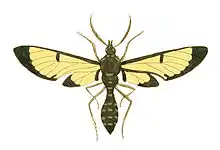Trichura coarctata
Trichura coarctata is a moth in the subfamily Arctiinae. It was described by Dru Drury in 1773. It is found in Brazil (Para, Pernambuco).[1]
| Trichura coarctata | |
|---|---|
 | |
| Female | |
| Scientific classification | |
| Kingdom: | |
| Phylum: | |
| Class: | |
| Order: | |
| Family: | |
| Subfamily: | |
| Genus: | |
| Species: | T. coarctata |
| Binomial name | |
| Trichura coarctata (Drury, 1773) | |
| Synonyms | |
| |
Description
Upperside: Antennae pectinated, and thickest in the middle. Head black, with a blue spot in front. Neck blue. Thorax black, with an orange spot on each shoulder. Abdomen black; smallest next the thorax, with a row of golden-blue spots on each side, and another at the top; at the extremity is placed a hairy bristle, about a quarter the length of the abdomen. Wings yellowish and transparent. The anterior having a black narrow border running round all their edges, except the anterior ones; and in the middle of each is an oblong black spot, joining to the anterior edge, which reaches almost halfway across the wing. Posterior wings with a black border along the abdominal edges and the upper corners; the anterior and external edges having none. The extremity of the body of the male is furnished with a villose tail, as long as the body.
Underside: Palpi externally white but internally black. Tongue curled up. Breast black, the sides being blue. Legs black. Thighs white within, and blue without. Abdomen, next the thorax, white; the remainder being black, with four white spots on each side; that next the anus being the smallest. Wings as on the upperside; except the anterior, which have a yellowish border running along the posterior edges. Wingspan 1 3⁄4 inches (45 mm).[2]
References
- Savela, Markku. "Trichura coarctata (Drury, 1773)". Lepidoptera and Some Other Life Forms. Retrieved December 12, 2017.
- Drury, Dru (1837). Westwood, John (ed.). Illustrations of Exotic Entomology. 2. pp. 50-51. pl. XXVII.
- Pitkin, Brian & Jenkins, Paul. "Search results Family: Arctiidae". Butterflies and Moths of the World. Natural History Museum, London.